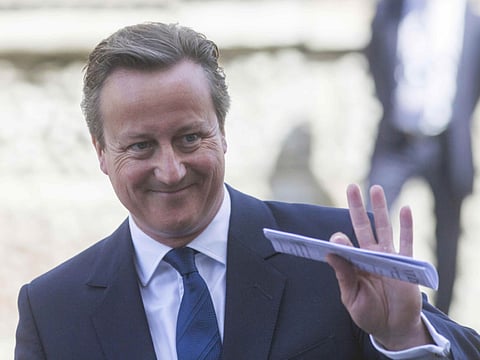Marx was wrong — politics is Darwinian
The British voter sees Cameron as fortunate rather than inspired. Yet in May he added to his vote share and parliamentary seats, a rare enough feat for an incumbent

Leadership is to politics what productivity is to economics: not quite the only thing that matters but almost. A party with a good frontman or woman can afford to get everything else wrong, and probably will not. Most other variables — policy, strategy, organisation — flow from the leader.
It is anti-intellectual to see politics like this. We are meant to read impersonal forces and historic inevitability into every election result; the current self-mutilation of Britain’s Labour party is supposedly an epiphenomenon of a pan-European crisis of the left.
But run this counterfactual: imagine that one of the several schemes to replace Gordon Brown as prime minister before the 2010 general election had succeeded. Almost any other candidate would have saved enough seats to shut out the Conservatives. Their recriminations would have brought down British Prime Minister David Cameron, their moderate leader, in favour of a right-winger, inviting defeat in 2015 too. This summer, all talk would be of a Labour imperium and a Tory party toying with extinction. Instead, we are discussing the inverse.
There are assumptions in this thought experiment but they are not outlandish. We underrate how much the narrow survival of one leader skewed recent history, and how much the departure of another will distort the future. The resignation of Cameron as prime minister before 2020 will change politics more than anyone seems to appreciate, including his own Tories, who tend to assume he is eminently replaceable, and the many Labour MPs who privately write off the next election. For electoral import, it will be a bigger event than the EU referendum, the eradication of the budget deficit or the economic downturn that some sense in the offing.
Because of his outward banality, the vanilla sheen that says “Son-in-law of the Year”, we have Cameron down as fortunate rather than inspired. Yet in May he added to his vote share and parliamentary seats, a rare enough feat for an incumbent that is all the more remarkable for being preceded by five years of stringent fiscal policy. He will probably leave office at a time of his own choosing after keeping Britain in the EU and balancing the first budget since 2002. Some of this is the dumb luck of a man who has walked between the raindrops since his youth in England’s rural arcadia. But not all of it can be.
What makes him special is his lack of a specialism. He is not 10 out of 10 at anything — bar, perhaps, temperament — but he is seven or eight at most things. George Osborne, his chancellor and readiest heir, is a technically superior executive. He manipulates the machinery of state to his ends. When he pulls strings, puppets twitch. Boris Johnson, the London mayor, is more charismatic. Sajid Javid, the business secretary, has a more rousing life story. But roundedness is the test of a prime minister, who must give a television address after a disaster, make 20 dry policy decisions and host the Chilean president — sometimes all in the same afternoon.
Cameron also normalises the abnormal. He makes a government of unsettling ambition seem middle-of-the-road. It is cutting the state and reforming every public service simultaneously. It is putting constitutional fundamentals — the union, United Kingdom’s place in Europe — on the table. After five breathless years as prime minister, the phrase that focus groups most commonly apply to Cameron is “family man”. When you adjust for the disruption in national life he has overseen, and the sulphurous reputation of politicians among grouchy Britons, that is astoundingly benign.
Ideological Conservatives, who accuse him of believing in the square root of nothing, miss the point. It is precisely his reputation as an unromantic problem-solver that allows the government to take risks. Voters trust the Tories not to go too far as long as he is at the top.
All democracies are presidential. Some, such as France and America, make it official; others, such as Britain and Canada, drape theirs in a parliamentary cloak. Voters are not just slaves to the teleologic drive of history. They judge a party — its competence, its comprehension of the national mood — by its leader, and pitilessly weed out anyone who falls short. Politics is more Darwinian than Marxist.
The Tories prosper because they have Cameron and Labour has had no serviceable leader since former prime minister Tony Blair. In the breeziness with which Tories debate his replacement, and the fatalism with which Labour discuss the future, it is clear both sides underrate Cameron. His successor may be better than whomever Labour, a party committed to punching itself in the face, offers up in 2020. But it is not certain, and no other variable matters as much.
—Financial Times


